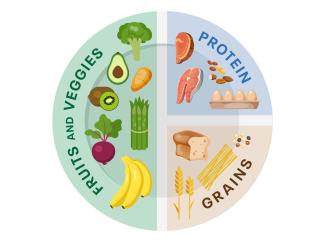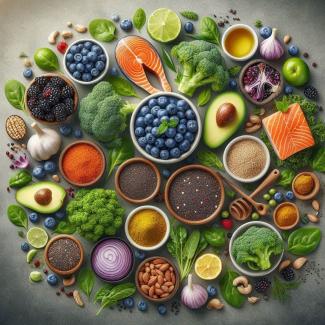
Vitamin A plays a crucial role in maintaining eye health, and its deficiency can lead to a range of eye problems. Here's how vitamin A affects eye health:
- Retinal Function: Vitamin A is essential for the proper functioning of the retina, a layer of cells in the back of the eye that contains photoreceptor cells (rods and cones). Retinal is a form of vitamin A that combines with a protein called opsin to form visual pigments, such as rhodopsin in rod cells. These visual pigments are necessary for the detection of light and the conversion of light signals into electrical signals that the brain can interpret as vision.
- Night Vision: Adequate vitamin A levels are crucial for good night vision. When there's not enough vitamin A, it can result in a condition known as night blindness, where it becomes difficult to see in low light conditions.
- Eye Surface Health: Vitamin A is also necessary for maintaining the health of the cornea, the clear front surface of the eye. A deficiency in vitamin A can lead to a condition called xerophthalmia, which includes dryness of the eye, damage to the cornea, and ultimately, blindness.
- Immune System Support: The immune system in the eyes depends on vitamin A to help fight off infections and maintain eye health. A deficiency in vitamin A can weaken the eye's ability to combat infections and lead to various eye issues.
- Antioxidant Properties: Vitamin A acts as an antioxidant in the body, helping to protect cells, including those in the eyes, from oxidative stress. This can help prevent damage to the eye tissues and reduce the risk of age-related eye diseases, such as macular degeneration.
It's important to note that while vitamin A is essential for eye health, excessive intake can be harmful. Too much vitamin A, either through excessive supplementation or consumption of foods extremely high in vitamin A, can lead to a condition known as hypervitaminosis A, which can have adverse effects on health, including potential harm to the eyes. It's important to maintain a balanced and healthy diet to ensure you get the right amount of vitamin A for optimal eye health without overconsumption. If you suspect a deficiency or have concerns about your eye health, it's best to consult a healthcare professional for guidance.
In which food can I get Vitamin A for better vision?
Vitamin A is readily available in a variety of foods, and including these in your diet can help support better vision and overall eye health. Here are some food sources of vitamin A:
- Carrots: Carrots are often associated with good eye health because they are rich in beta-carotene, a form of vitamin A that is essential for vision.
- Sweet Potatoes: Sweet potatoes are another excellent source of beta-carotene, providing a substantial amount of vitamin A.
- Pumpkin: Pumpkin is rich in both vitamin A and beta-carotene, making it a nutritious choice for eye health.
- Spinach: Dark leafy greens like spinach contain not only vitamin A but also lutein and zeaxanthin, which are antioxidants that help protect the eyes.
- Kale: Like spinach, kale is a leafy green that is high in both vitamin A and other eye-protective nutrients.
- Broccoli: Broccoli is a good source of vitamin A and contains lutein, making it a healthy choice for eye health.
- Mangoes: Mangoes provide a significant amount of vitamin A and are a tasty way to support your vision.
- Cantaloupe: This fruit is rich in vitamin A and provides a delicious option for maintaining eye health.
- Red Bell Peppers: Red bell peppers are not only a source of vitamin A but also vitamin C, which can help protect the eyes from oxidative damage.
- Liver: Animal liver, especially beef liver, is a highly concentrated source of vitamin A. Consumed in moderation, it can be a valuable addition to your diet.
- Eggs: Eggs contain vitamin A, mainly in the yolk. They are also a good source of lutein and zeaxanthin.
- Fish: Some fish, such as salmon and mackerel, contain vitamin A, and their omega-3 fatty acids can also support eye health.
- Dairy products: Milk, cheese, and yogurt contain vitamin A and are essential for maintaining healthy eyes.
Remember that a balanced diet that includes a variety of these foods can help ensure you get the necessary amount of vitamin A for good vision and overall eye health. It's generally best to obtain your vitamins from food sources, but in some cases, a doctor or healthcare professional might recommend vitamin A supplements if you have a deficiency. However, it's important to consult with a healthcare provider before starting any supplementation.






